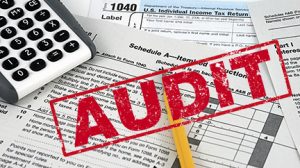FIRS Tax Audit
FEDERAL INLAND REVENUE TAX AUDIT- How to Prepare For It

Did you get one of those scary audit notices from the FIRS in your mailbox? Do not fret because you are not alone. It is a yearly practice for the Federal Inland Revenue Service to send out millions of letters and notices to taxpayers. However, a notice on tax audit is not the only reason a tax payer could receive a notice from the FIRS. Other occasions you could receive a notice from the FIRS includes:
- When the FIRS changes information on your tax return.
- When you owe taxes.
- When the FIRS has a question about your tax return.
- When the FIRS is requesting additional information from you.
- When you are due a smaller or larger tax refund.
- When the FIRS needs to verify your identity.
- When the FIRS is informing you about delays in processing your tax return.
Taxpayers should understand that an audit in no way implies suspicion of criminal activity. Tax returns are complicated documents, carrying financial data that must be evaluated to confirm accuracy, hence the need for a tax audit. The audit process is known as an examination.
The FIRS is responsible for assessing collecting, accounting for, and enforcing payment of taxes due to the government or any of it agencies. Evading tax is a common phenomenon among Nigerians. This is reflected in the total number of registered tax payers in the National Tax Registry, which stood at 13.4 million tax payers as at November, 2016.
How then do you prepare for a tax audit by the FIRS after being served with a notice? We have listed below five steps you could take to ensure that your tax audit examination goes smoothly.
- Promptly respond to an audit notice: When served with an audit notice, you have thirty days to respond to it. Avoid procrastinating your response, as the time you spend ignoring a letter could create a negative impression about you in the mind of the FIRS auditor. This could in turn make them take special interest in your case, because they might start to entertain the thought that you have a skeleton in your cupboard. This would not bode well for the tax payer, because the longer the audit examination stretches, the more likely it becomes that the auditor would uncover a discrepancy.
- Seek representation if necessary: Before an audit examination commences, you need to decide if you need a tax professional present with you or not. A tax payer could be backed against the wall by an auditor due to his/her lack of knowledge about the auditing process. Tax payers could disclose something they don’t want to disclose when they are in a tensed state, which is a state quite normal with tax payers undergoing this examination. This is why it is necessary to protect your interest by having a tax professional present, who has an adept knowledge of tax audits, and is well aware of FIRS tactic.
- Get your paperwork ready: Tax auditing involves a lot of paperwork. You need to gather the forms the FIRS has requested. You also need to ensure that you have enough copies of the required documents. Organizing your paperwork could impress the auditor and give them an impression that you are willing to cooperate. This could make the whole process go smoothly. Ensure that the documents you have match up with the year that is being audited. If you realize you have misplaced certain records, you are advised to immediately call and request that duplicates be sent to you.
- Do not lie or make misleading statements: The FIRS auditor may ask questions they already know the answers to, in order to see how much they can trust you. It is in your best interest to be completely honest. However, do not ramble and say anything more than is required. Always try to be brief with your replies. The less you say, the better for you. Lying could be to your own detriment.
- Know your rights: During the audit examination, try to be polite and compliant. Only show the FIRS auditor documents that are specifically requested for. Do not get ahead of yourself because you are fidgety. Always remember that you have rights and deserve fair treatment as a citizen. Here are your taxpayer rights during the audit process:
- A right to professional and courteous treatment by FIRS employees.
- A right to privacy and confidentiality about tax matters.
- A right to know why the FIRS is asking for information, how the FIRS will use it, and what will happen if the requested information is not provided.
- A right to representation, by oneself or an authorized representative.
- A right to appeal disagreements, both within the FIRS and before a court.
FOR FURTHER ENQUIRY, PLEASE CONTACT:
Abiola Fajimi
Partner
Tel: 08035353068.
Email: afajimi@pml.com.ng


